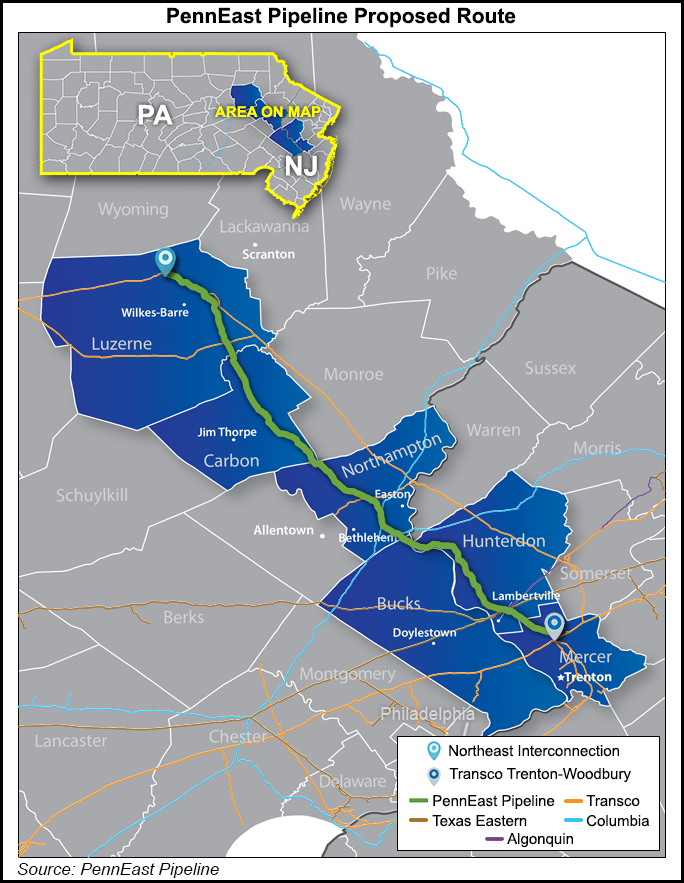Regulatory | E&P | NGI All News Access
New Jersey AG Argues Against FERC Tolling Order for PennEast Rehearing Request
The FERC deputy secretary who granted a request from two New Jersey agencies to rehear an order that issued certificates authorizing the PennEast pipeline was acting outside his authority, according to New Jersey Attorney General (AG) Gurbir Grewal.

On Feb. 20 the state asked for a rehearing and rescission of the Federal Energy Regulatory Commission’s Jan. 19 certificate authorizing the project because it claimed the underlying environmental review failed to meet the National Environmental Policy Act [CP15-558].
The New Jersey Department of Environmental Protection (NJDEP) and the Delaware and Raritan Canal Commission (DRCC) said the review fell short by relying on “woefully insufficient data; failing to adequately consider the alternatives, failing to meet other federal environmental requirements, including minimizing impacts to wetlands before considering mitigation; and failing to require drilling methods that could impact water quality under the Clean Water Act.”
In their filing, the NJDEP and DRCC said that since FERC relied on a fundamentally flawed final environmental impact statement in issuing the order, “the order itself is also defective.” They also filed a motion to stay the project’s authority to condemn properties in the state while its rehearing request is pending.
FERC Deputy Secretary Nathaniel J. Davis Sr. issued an order Feb. 22 granting a rehearing “for the limited purposes of further consideration, and timely-filed rehearing requests will not be deemed denied by operation of law.” Based on that language, NJDEP and DRCC now say the purpose of the order “is to toll the time for the Commission to take action on the requests for a rehearing and stay of the Order Issuing Certificates,” essentially arguing that FERC has employed a stall tactic to delay action on the rehearing request.
However, according to FERC regulation, they argued, Davis “has not been delegated the authority to toll the time for action on rehearing requests when requests are combined with ‘any other request for Commission action, such as a request to intervene in a proceeding or for a stay of a proceeding’…NJDEP and the DRCC also have requested a stay.
“Accordingly, the deputy secretary did not have authority to issue the Feb. 22, 2018 tolling order as to NJDEP and DRCC’s request for a rehearing and stay.”
PennEast would move more than 1 Bcf/d of shale gas from northeastern Pennsylvania to New Jersey. About one-third of the 120-mile pipeline would be in New Jersey. The project is scheduled to enter service in 2019.
The project has repeatedly been opposed by New Jersey officials. In a letter sent to PennEast last month, NJDEP said it was denying the project’s freshwater wetlands permit and federal water quality certification application without prejudice and invited the company to resubmit it.
In April 2017, after PennEast filed for the permits, the agency told sponsors that the application was incomplete due in part to a lack of landowner permission to survey certain parts of the proposed route. NJDEP closed its environmental review in June, denying a request for more time to address the application’s deficiencies, after PennEast failed to submit the requested information within 60 days.
Although most of the setbacks occurred before newly sworn-in Gov. Phil Murphy, a Democrat, took office, there has been speculation about how his administration will handle projects such as PennEast. The latest filing, which effectively argues against the state’s previous position on rehearing, could be a signal that New Jersey officials will turn to the courts in their battle.
Murphy previously ordered the state to rejoin the Regional Greenhouse Gas Initiative and issued a transition report calling for more renewable energy, stronger efforts to combat climate change and more protection for water resources.
© 2024 Natural Gas Intelligence. All rights reserved.
ISSN © 2577-9877 | ISSN © 2158-8023 |
